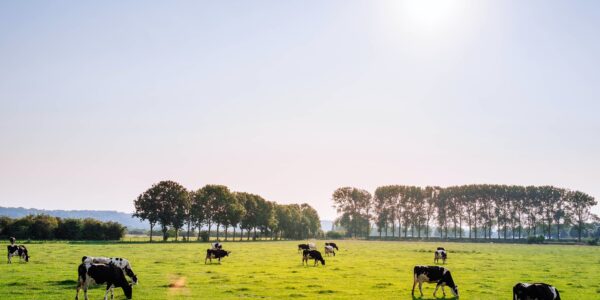Recording online debate on agriculture and the Green Deal
On September 6th we held an online debate on how agriculture can contribute to a greener EU. Watch the video below.

A new policy period for a more modern (greener and fairer) common European Agricultural Policy (CAP) started on January 1, 2023. One of its main pillars focuses on a sustainable future for European farmers with climate and environmental welfare at the heart of rural development.
This new theoretical framework came not a second too soon. The climate ambitions within the Green Deal are high and the deadlines to meet the targets are dangerously close. To make the ambitions within the 'farm to fork' strategy and the 'biodiversity strategy' achievable, the CAP could not be left behind.
Moreover, a new approach for European farmers themselves was badly needed. Indeed, global warming is making itself strongly felt in this sector in all EU member states. Extreme weather conditions threaten harvests, groundwater is shrinking and biodiversity continues to decline. At the same time, agriculture itself is responsible for about 10% of Europe's CO2 emissions.
In this debate, we explore how these policies translate into practice and which innovative techniques are applied. Our national experts share their vision of a sustainable future for farmers and provide some examples of good practices or pioneering projects to inspire others.
Some of the questions that we will focus on in the debate are: What is the agriculture of the future? How far is Croatia, Denmark, and Belgium from reaching the EU's climate goals within agriculture? What innovative agricultural projects are there in the three countries that can contribute to the green transition? What trends are noticeable in the agricultural landscape in Croatia, Denmark and Belgium?
Our experts: Jørgen Eivind Olesen (Denmark), Vladimier Margeta (Croatia) and Kurt Sannen (Belgium)
Jørgen Eivind Olesen
Jørgen Eivind Olesen is a professor and head of department of Agroecology at the University of Aarhus. He is a section leader on the approx. 35-person research unit 'Climate and water' in the city of Foulum. He is also an adjunct professor at the University of Copenhagen and at Gansu Agricultural Univercity in China. His research focuses on the adaption of agricultural production systems to climate change and emission of greenhouse gases from agriculture and he has a very broad experience on the interaction between agricultural (and agroecosystems) activities and the environment which involves both the effect of agriculture on environment and the effect of enviornmental change on agroecosystems. He holds a Master of Science in Agriculture from The Royal Veterinary and Agricultural College from 1983.
Vladimir Margeta
Vladimir Margeta is an associate professor at the Faculty of Agrobiotechnical Sciences in Osijek. He is a member of the Department for Animal Production and Biotechnology, where he teaches at the Pig Breeding and Biological and Zootechnical Principles in Pig Breeding modules. Scientific interests of Vladimir Margeta are aimed at the improvement and development of pig keeping technology, molecular genetic research for the purpose of improving the properties of carcasses and pork meat, and defining, preserving and breeding autochthonous pig breeds in the Republic of Croatia. In addition to the above, the subject of his scientific and professional interest is ecological agriculture, the Green transition, sustainable production systems in agriculture and traditional agriculture.
Kurt Sannen
Kurt Sannen has a master in agricultural engineering and work experiences in NGO's, in government and his own business. His career is now focussed on Rural Development and sustainability. During the last several years he has been working at both international level and local communities. His job is mainly concerned with sustainable agriculture and biodiversity. More recently he had the chance to work with farmers, focusing on new ways to increase their value chains while paying greater attention to nature conservation on their farms. He is interested in challenges related to CSR or ESG and improving sustainability in the agricultural and food sector.